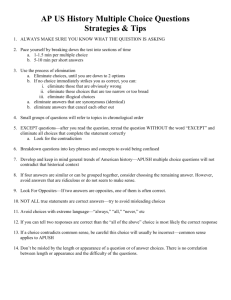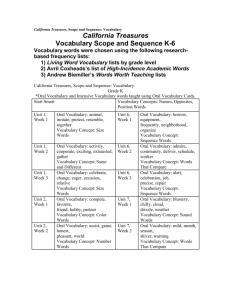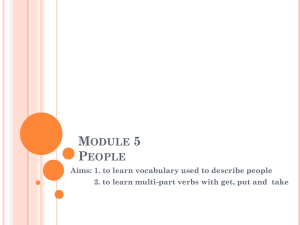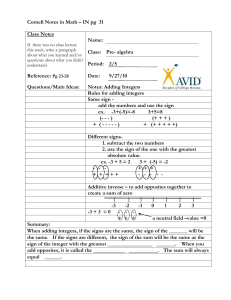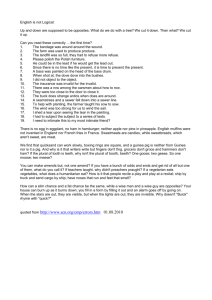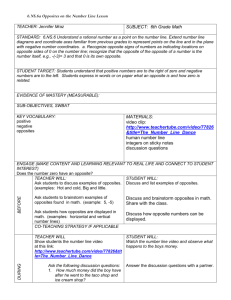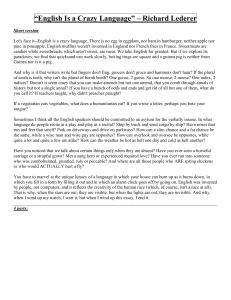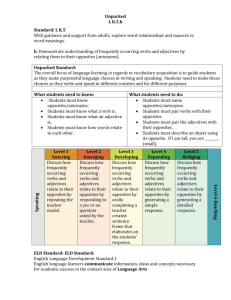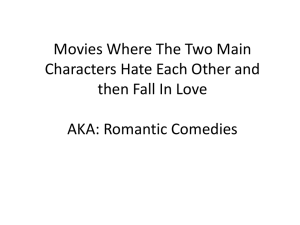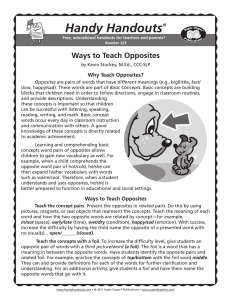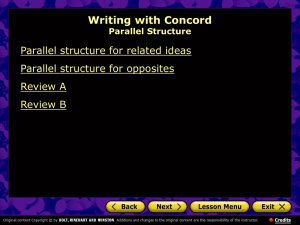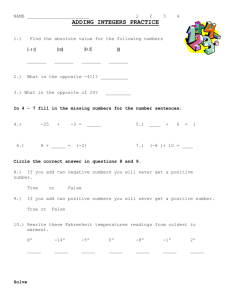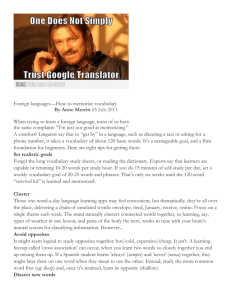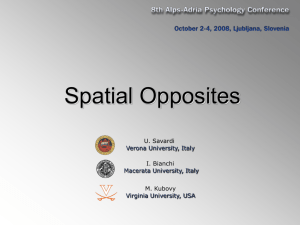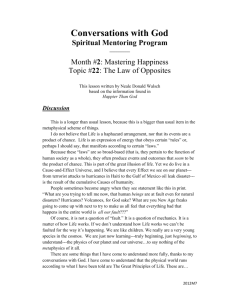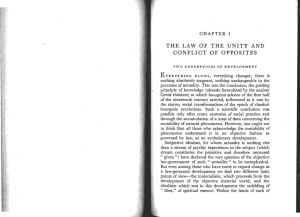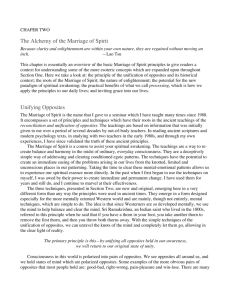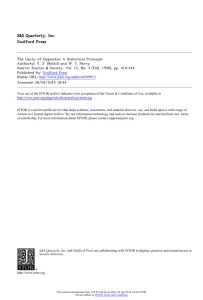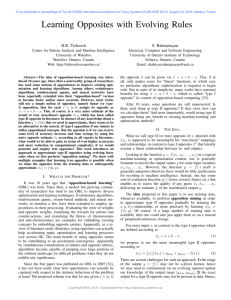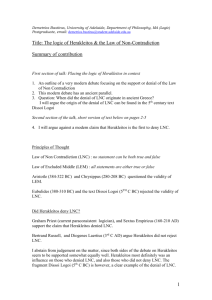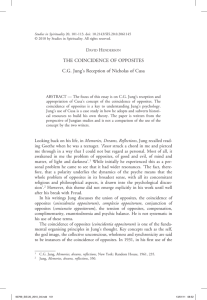English is a Crazy Language
advertisement
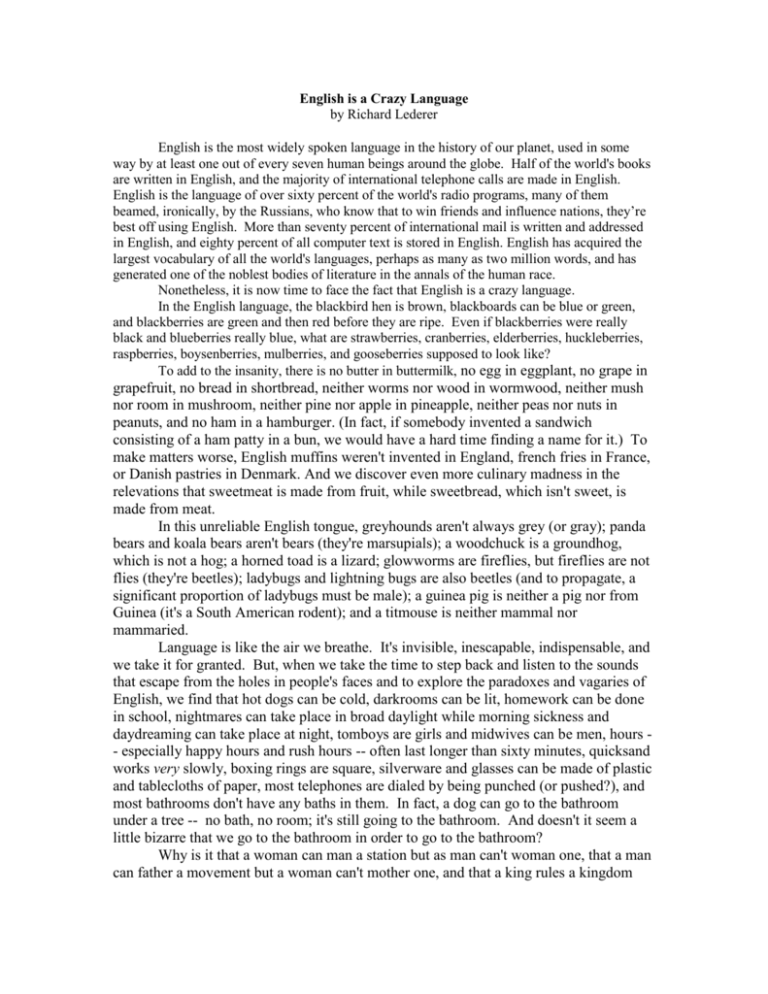
English is a Crazy Language by Richard Lederer English is the most widely spoken language in the history of our planet, used in some way by at least one out of every seven human beings around the globe. Half of the world's books are written in English, and the majority of international telephone calls are made in English. English is the language of over sixty percent of the world's radio programs, many of them beamed, ironically, by the Russians, who know that to win friends and influence nations, they’re best off using English. More than seventy percent of international mail is written and addressed in English, and eighty percent of all computer text is stored in English. English has acquired the largest vocabulary of all the world's languages, perhaps as many as two million words, and has generated one of the noblest bodies of literature in the annals of the human race. Nonetheless, it is now time to face the fact that English is a crazy language. In the English language, the blackbird hen is brown, blackboards can be blue or green, and blackberries are green and then red before they are ripe. Even if blackberries were really black and blueberries really blue, what are strawberries, cranberries, elderberries, huckleberries, raspberries, boysenberries, mulberries, and gooseberries supposed to look like? To add to the insanity, there is no butter in buttermilk, no egg in eggplant, no grape in grapefruit, no bread in shortbread, neither worms nor wood in wormwood, neither mush nor room in mushroom, neither pine nor apple in pineapple, neither peas nor nuts in peanuts, and no ham in a hamburger. (In fact, if somebody invented a sandwich consisting of a ham patty in a bun, we would have a hard time finding a name for it.) To make matters worse, English muffins weren't invented in England, french fries in France, or Danish pastries in Denmark. And we discover even more culinary madness in the relevations that sweetmeat is made from fruit, while sweetbread, which isn't sweet, is made from meat. In this unreliable English tongue, greyhounds aren't always grey (or gray); panda bears and koala bears aren't bears (they're marsupials); a woodchuck is a groundhog, which is not a hog; a horned toad is a lizard; glowworms are fireflies, but fireflies are not flies (they're beetles); ladybugs and lightning bugs are also beetles (and to propagate, a significant proportion of ladybugs must be male); a guinea pig is neither a pig nor from Guinea (it's a South American rodent); and a titmouse is neither mammal nor mammaried. Language is like the air we breathe. It's invisible, inescapable, indispensable, and we take it for granted. But, when we take the time to step back and listen to the sounds that escape from the holes in people's faces and to explore the paradoxes and vagaries of English, we find that hot dogs can be cold, darkrooms can be lit, homework can be done in school, nightmares can take place in broad daylight while morning sickness and daydreaming can take place at night, tomboys are girls and midwives can be men, hours - especially happy hours and rush hours -- often last longer than sixty minutes, quicksand works very slowly, boxing rings are square, silverware and glasses can be made of plastic and tablecloths of paper, most telephones are dialed by being punched (or pushed?), and most bathrooms don't have any baths in them. In fact, a dog can go to the bathroom under a tree -- no bath, no room; it's still going to the bathroom. And doesn't it seem a little bizarre that we go to the bathroom in order to go to the bathroom? Why is it that a woman can man a station but as man can't woman one, that a man can father a movement but a woman can't mother one, and that a king rules a kingdom but a queen doesn't rule a queendom? How did all those Renaissance men reproduce when there don't seem to have been any Renaissance women? A writer is someone who writes, and a stinger is something that stings. But fingers don't fing, grocers don't groce, haberdashers don't haberdash, hammers don't ham, and humdingers don't humding. If the plural of tooth is teeth , shouldn't the plural of booth be beeth ? One goose, two geese -- so one moose, two meese? One index, two indices -- one Kleenex, two Kleenices? If people ring a bell today and rang a bell yesterday, why don't we say that they flang a ball? If they wrote a letter, perhaps they also bote their tongue. If the teacher taught, why isn't it also true that the preacher praught? Why is it that the sun shone yesterday while I shined my shoes, that I treaded water and then trod on the beach, and that I flew out to see a World Series game in which my favorite player flied out? If we conceive a conception and receive at a reception, why don't we grieve a greption and believe a beleption? If a horsehair mat is made from the hair of horses and a camel's hair brush from the hair of camels, from what is a mohair coat made? If a vegetarian eats vegetables, what does a humanitarian eat? If a firefighter fights fire, what does a freedom fighter fight? If a weightlifter lifts weights, what does a shoplifter lift? If pro and con are opposites, is congress the opposite of progress? Sometimes you have to believe that all English speakers should be committed to an asylum for the verbally insane. In what other language do people drive in a parkway and park in a driveway? In what other language do people recite at a play and play at a recital? In what other language do privates eat in the general mess and generals eat in the private mess? In what other language do people ship by truck and send cargo by ship? In what other language can your nose run and your feet smell? How can a slim chance and a fat chance be the same and a bad licking and a good licking be the same, while a wise man and a wise guy are opposites? How can sharp speech and blunt speech be the same and quite a lot and quite a few the same, while overlook and oversee are opposites? How can the weather be hot as hell one day and cold as hell the next? If button and unbutton and tie and untie are opposites, why are loosen and unloosen and ravel and unravel he same? If bad is the opposite of good, hard the opposite of soft, and up the opposite of down, why are badly and goodly, hardly and softy, and upright and downright not opposing pairs? If harmless actions are the opposite of harmful nonactions, why are shameful and shameless behavior the same and pricey objects less expensive than priceless ones. If appropriate and inappropriate remarks and passable and impassable mountain trails are opposites, why are flammable and inflammable materials, heritable and inheritable property, and passive and impassive people the same and valuable objects less treasured than invaluable ones? If uplift is the same as lift up, why are upset and set up opposite in meaning? Why are pertinent and impertinent, canny and uncanny, and famous and infamous neither opposites nor the same? How can raise and raze and reckless and wreckless be opposites when each pair contains the same sound? Why is it that when the sun or the moon or the stars are out, they are visible, but when the lights are out, they are invisible; that when I clip a coupon from a newspaper I separate it, but when I clip a coupon to a newspaper, I fasten it; and that when I wind up my watch, I start it, but when I wind up this essay, I shall end it? English is a crazy language.
